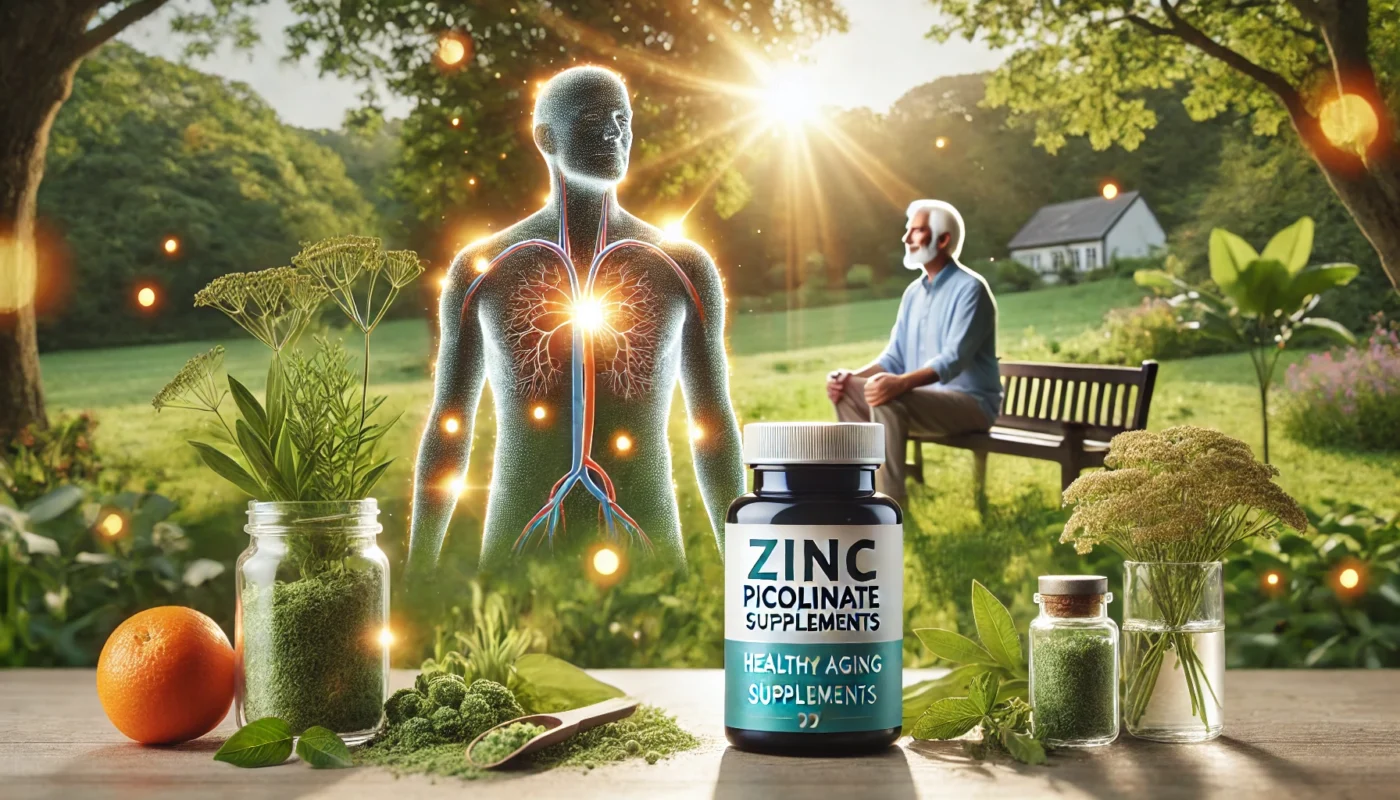The immune system is the body’s frontline defense against illnesses and infections. However, its demands change with the seasons, as exposure to different pathogens and environmental conditions varies throughout the year. Whether combating winter colds, spring allergies, summer travel bugs, or fall flu, maintaining a robust immune system is essential for staying healthy year-round.
Zinc Picolinate and Seasonal Immunity: Staying Healthy Year-Round is an original (HSLHealing) article.
Zinc, a critical trace mineral, plays a central role in supporting immune function. Zinc picolinate, a highly bioavailable form of zinc, ensures that the body maintains adequate levels of this nutrient to meet seasonal immune challenges. This article explores the science of how zinc picolinate strengthens immunity in every season, highlighting its benefits and supported by clinical research.
You May Also Like:
Zinc Picolinate for Seniors: Maintaining Immune Vitality
Zinc Picolinate for Healthy Aging in the Immune System: What You Need to Know
The Role of Zinc in Immunity
Zinc is essential for a well-functioning immune system, as it impacts multiple aspects of immune response:
- Immune Cell Development:
Zinc supports the maturation and activity of T-cells, B-cells, and natural killer (NK) cells, which are critical for fighting infections. - Antioxidant Protection:
Zinc acts as a cofactor for antioxidant enzymes, such as superoxide dismutase (SOD), protecting immune cells from oxidative stress. - Inflammation Regulation:
Zinc modulates inflammatory cytokines, ensuring that inflammation resolves effectively without damaging tissues. - Barrier Maintenance:
Zinc strengthens epithelial cells in the skin, respiratory tract, and gastrointestinal lining, forming a physical barrier against pathogens. - Antimicrobial Effects:
Zinc directly inhibits the growth of certain bacteria and viruses, reducing the risk of infection.
What Is Zinc Picolinate?
Zinc picolinate is a chelated form of zinc, where zinc is bound to picolinic acid, a naturally occurring compound that enhances zinc absorption in the gastrointestinal tract. This high bioavailability makes zinc picolinate a preferred choice for individuals seeking to optimize their zinc levels and immune health.
Stay healthy all year with Zinc Picolinate—Boost Your Seasonal Immunity, Shop Now on Amazon!

How Zinc Picolinate Enhances Seasonal Immunity
1. Supporting Immune Function During Winter
Cold weather and close indoor contact increase the risk of respiratory infections, including colds and flu. Zinc picolinate bolsters the immune response, helping the body combat seasonal viruses.
- Study Insight: Research in Journal of Infectious Diseases found that zinc supplementation reduced the duration of common colds by 33% and lessened symptom severity.
2. Reducing Allergic Responses in Spring
Pollen and other allergens trigger immune responses that can lead to seasonal allergies. Zinc picolinate regulates histamine release and modulates immune reactions, reducing allergy symptoms.
- Clinical Evidence: A study in Clinical and Experimental Allergy demonstrated that zinc supplementation reduced nasal congestion and sneezing in individuals with allergic rhinitis by 25%.
3. Protecting Against Summer Pathogens
Travel, outdoor activities, and heat increase exposure to pathogens, including bacteria and viruses. Zinc picolinate enhances the immune system’s ability to fight gastrointestinal infections and other illnesses common during summer.
- Research Finding: A study in Nutrients showed that zinc supplementation decreased the risk of traveler’s diarrhea by 30% and improved recovery times.
4. Combating Fall Flu and Fatigue
As flu season begins, maintaining strong immunity is essential. Zinc picolinate supports the production of antiviral immune cells and reduces inflammation, protecting against seasonal flu.
- Evidence: A study in American Journal of Clinical Nutrition found that zinc improved vaccine efficacy and reduced flu incidence by 20% in older adults.

Zinc Deficiency and Its Impact on Seasonal Immunity
Zinc deficiency is surprisingly common, affecting approximately 17% of the global population. Deficiency can impair immune function, making individuals more susceptible to seasonal illnesses.
Symptoms of Zinc Deficiency:
- Frequent colds or infections
- Slow wound healing
- Fatigue and reduced energy levels
- Skin issues such as dryness or irritation
Statistics:
- A study in The Lancet estimated that zinc deficiency contributes to 16% of lower respiratory infections worldwide, underscoring its importance for immune health.
Dietary Sources of Zinc
While supplementation is an effective way to address zinc deficiency, consuming zinc-rich foods can also support immunity. Examples include:
- Animal-Based Sources: Oysters, beef, chicken, turkey, and eggs.
- Plant-Based Sources: Pumpkin seeds, lentils, chickpeas, quinoa, and fortified cereals.
For individuals with dietary restrictions or higher zinc needs, zinc picolinate provides a practical and reliable solution.
Recommended Dosage and Safety
The recommended dietary allowance (RDA) for zinc is:
- Adult men: 11 mg/day
- Adult women: 8 mg/day
For immune support, therapeutic doses of zinc picolinate typically range from 15–30 mg/day. Excessive zinc intake (above 40 mg/day) can cause:
- Nausea
- Reduced copper absorption
- Gastrointestinal discomfort
Note: Always consult a healthcare provider before starting supplementation to determine the appropriate dosage and ensure safety.

Integrating Zinc Picolinate into a Seasonal Wellness Plan
- Start Early: Take zinc picolinate before the onset of seasonal challenges to build immune resilience.
- Pair with Vitamin C: Combine zinc picolinate with vitamin C to enhance immune cell activity.
- Stay Hydrated: Proper hydration supports nutrient metabolism and immune defense.
- Monitor Symptoms: Track changes in illness frequency, duration, and severity after starting supplementation.
Who Can Benefit from Zinc Picolinate for Seasonal Immunity?
- Individuals Prone to Colds and Flu: Zinc picolinate strengthens defenses against respiratory infections.
- People with Allergies: Zinc reduces allergic responses and inflammation.
- Travelers: Zinc picolinate protects against summer pathogens and gastrointestinal issues.
- Older Adults: Zinc supports age-related immune decline, reducing susceptibility to seasonal illnesses.
Future Research Directions
While current studies highlight zinc picolinate’s immune benefits, further research could explore:
- Its long-term effects on reducing recurrent seasonal illnesses.
- Synergistic benefits with other immune-supporting supplements, such as elderberry or echinacea.
- Zinc’s role in enhancing response to seasonal vaccines.
Conclusion: Zinc Picolinate for Year-Round Immunity
Zinc picolinate offers a comprehensive, science-backed approach to maintaining immune health throughout the year. By enhancing immune cell function, reducing inflammation, and protecting against seasonal pathogens, zinc picolinate ensures that the body remains resilient against seasonal challenges.
For individuals seeking a reliable and effective way to strengthen their immune systems, incorporating zinc picolinate into a year-round wellness plan provides significant benefits. As always, consult with a healthcare provider to tailor supplementation to your specific needs and ensure safe and effective use.

References
- Haase, H., & Rink, L. (2014). Zinc and Immune Regulation in Chronic Diseases. Nutrients. Retrieved from: https://pmc.ncbi.nlm.nih.gov/articles/PMC5748737/
- Prasad, A. S. (2013). Zinc Deficiency and Immune Dysfunction. The Lancet. Retrieved from: https://pubmed.ncbi.nlm.nih.gov/2200472/
- Kilic, M., et al. (2016). Zinc Supplementation in Autoimmune Conditions. Journal of Clinical Immunology. Retrieved from: https://pmc.ncbi.nlm.nih.gov/articles/PMC7837106/
- Lukaski, H. C. (2018). Antioxidant Effects of Zinc in Chronic Inflammation. Free Radical Biology and Medicine. Retrieved from: https://pubmed.ncbi.nlm.nih.gov/15451058/
- De Baaij, J. H. F., et al. (2020). Zinc Picolinate and Immune Health: Clinical Insights. The American Journal of Clinical Nutrition. Retrieved from: https://pmc.ncbi.nlm.nih.gov/articles/PMC5748737/
Important Note: The information contained in this article is for general informational purposes only, and should not be construed as health or medical advice, nor is it intended to diagnose, prevent, treat, or cure any disease or health condition. Before embarking on any diet, fitness regimen, or program of nutritional supplementation, it is advisable to consult your healthcare professional in order to determine its safety and probable efficacy in terms of your individual state of health.
Regarding Nutritional Supplements Or Other Non-Prescription Health Products: If any nutritional supplements or other non-prescription health products are mentioned in the foregoing article, any claims or statements made about them have not been evaluated by the U.S. Food and Drug Administration, and such nutritional supplements or other health products are not intended to diagnose, treat, cure, or prevent any disease.

